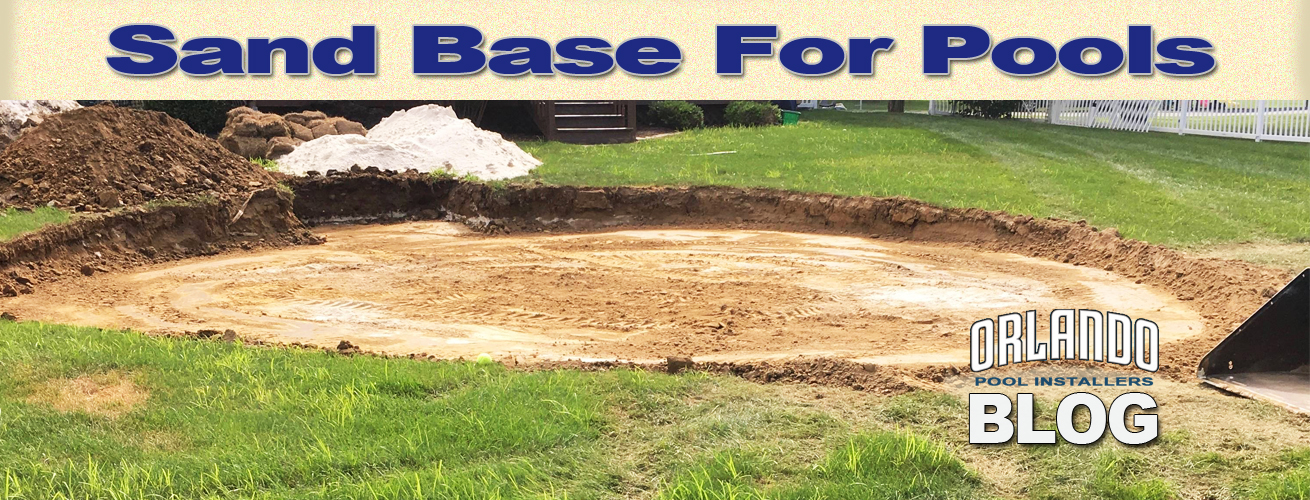One of the most frequently asked questions about above ground pool installations is “Do I need to use sand as a base for my pool’s construction?” This may be the case for many parts of the country but here in Orlando Florida the answer is NO most of the time. Actually this goes for most all of Central Florida and not just the Orlando area. I say this because the entire region is pretty much made up of sandy soil and adding anything to it often makes things worse.
Why Sand And What Type
Pool installation manuals and various internet pool websites often tell you to use sand for you pool base. This is because sand is very easy to obtain regardless of where you live in the country. It can be found at practically any landscape supply depot, concrete factory and home improvement stores in the Orlando area. Although home improvement stores rarely have it for sale in bulk amounts needed for this type of work. If you feel you need it, a quick call to one of these places and you’ll find it to be available and affordable. The catch is you’ll need a full size pick-up truck to go get it. If you don’t have access to a truck, some of these places will deliver sand to you if you order enough.
Although sand isn’t the best material for the job, it is pretty good and the type of sand doesn’t matter. You may hear someone ask what type of sand are you looking for, builder’s sand, play sand, concrete sand etc. This only refers to the size of the sand grains and that really doesn’t matter for this application. You just need clean sand free of debris to build your pool on.
Sand, When To Use It For Your Pool Floor
If your reading this blog your probably in the Orlando Florida area where the ground is mostly soft and manageable. This means that sand is likely NOT needed for your pool’s construction. Sand is not automatically going to make your pool floor better so don’t rush out to get some. In fact when too much sand is used the pool floor gets covered in foot prints and becomes bumpy. This is very uncomfortable to walk on and a pain to keep clean. The key to doing this correctly is to use only what you need and no more.
In most pool installations simply picking through the earth and removing twigs, sticks, rocks and other debris only takes a few minutes of time and all that’s needed to get a nice finish for your pool floor. This is much quicker and cheaper than buying sand and shoveling it into the pool’s location. And as I said before sand is not the best material, it just convenient. Sand doesn’t pack well so it’s easy to get those foot prints I mentioned earlier when it’s applied too thick.
If you happen to have a circumstance where to debris or roots are very heavy, sand would be a better choice. You should first get the ground as level as possible and remove as much debris as you can before adding any sand to the pool floor. Once you’ve done that than add the sand trying to keep it as thin as possible and not exceeding 3″. If you go any deeper the odds of foot prints goes up as the sand gets thicker.
Sand, When Not To Use It For Your Pool Floor
Aside from not using it when you don’t need it, sand shouldn’t be used when building your round pool on a hard surface like concrete or asphalt. I typically don’t recommend building oval pools on hard surfaces for other reasons so this pertains to round pools only.
The reason sand shouldn’t be used here is because it’ll wash away due to rain storms, and anyone who’s lived in Central Florida for any length of time knows it rains here everyday during the summer months. And every time it rains heavily some of the sand will be washed out from under the pool. Eventually the pool framework will no longer be covered by the sand and the metal edges and corners will be exposed. Once this happens the pool liner can easily be punctured by the metal components of the pool causing you to need a new liner and a different plan of attack.
For round pools being installed on concrete I recommend foam pool cove and an Armor Shield pool floor pad. These items will protect your pool liner from the pool framework and the rough concrete or asphalt surface. I mentioned these items by name deliberately because they work good. Do not substitute other materials for the Armor Shield and foam pool cove and expect great results. It’s important to note that some other brands of pool floor pads will cause your pool to rust out so be sure to buy the right one.
Above Ground Pools Installed In These Central Florida Cities
Altamonte Springs, Altoona, Apopka, Astatula, Auburndale, Avon Park, Azalea Park, Bartow, Belle Isle, Bithlo, Brevard County, Buena Ventura Lakes, BVL, Celebration, Christmas, Chuluota, Clermont, Cocoa, Cocoa Beach, Conway, Davenport, Daytona Beach, DeBary, Deland, Deltona, Eustis, Ferndale, Forest City, Fruitland Park, Geneva, Groveland, Haines City, Harmony, Howey-In-The-Hills, Hunters Creek, Indian Beach Harbor, Kissimmee, Lady Lake, Lake County, Lake Helen, Lakeland, Lake Mary, Leesburg, Lockhart, Longwood, Maitland, Malabar, Marineland, Mascotte, Meadow Woods, Melbourne, Merritt Island, Mims, Minneola, Montverde, Mt. Dora, Mt. Plymouth, Narcoossee, New Smyrna, Oak Hill, Ocala, Ocala National Forest, Ocoee, Orange City, Orange County, Orlando, Orlo Vista, Osceola County, Oviedo, Paisley, Palm Bay, Palm Coast, Pine Castle, Pine Hills, Polk City, Polk County, Port St. John, Reunion, Rockledge, Sanford, Satellite Beach, Sky Lake, St. Augustine, St. Cloud, Taft, Tangerine, Tavares, Titusville, Umatilla, Union Park, Volusia County, Wedgefield, Winter Garden, Winter Haven, Winter Park, Winter Springs, Zellwood

